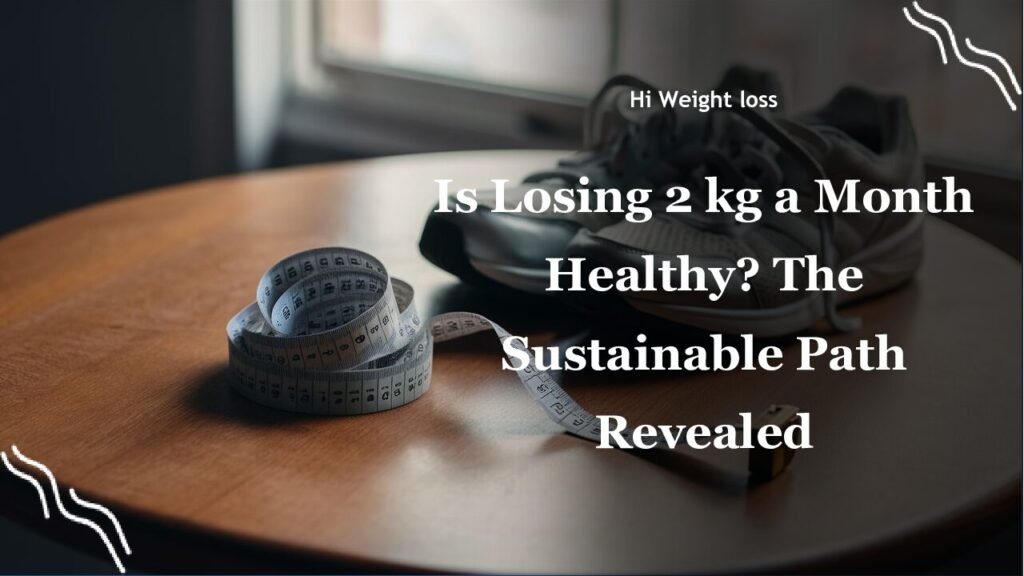“`
Are you feeling overwhelmed by the maze of weight loss advice out there, unsure if your goals are actually healthy? It’s easy to get caught up in crash diets and unrealistic expectations, leaving you frustrated and potentially harming your well-being. But what if I told you that losing 2 kg a month, approximately 4.4 pounds, isn’t just doable, but also a safe and sustainable path to a healthier you? This article dives deep into understanding why this pace is recommended by experts, explores practical tips to make it happen, and addresses your concerns with real insights and experiences.
Is Losing 2 kg a Month Healthy?
You’ve probably heard countless stories about rapid weight loss journeys, but are they really the best approach? Let’s cut through the noise and look at what health professionals recommend. The general consensus among reputable health organizations is that losing 1-2 pounds per week is a safe and effective approach for weight management. This translates to roughly 4-8 pounds per month, making 2 kg (about 4.4 pounds) a month squarely within that healthy range.
Understanding Sustainable Weight Loss
I remember when I first started my own health journey, I was so impatient. I wanted to see results fast! I tried a very restrictive diet, and while I did lose some weight quickly initially, I felt terrible, and the weight came right back. That’s when I realized sustainable weight loss is a marathon, not a sprint.
Why is a slower rate like losing 2 kg a month considered more sustainable? It’s simple: it’s about your body’s ability to adapt. When you lose weight slowly, your body can adjust to the changes without feeling deprived. This reduces the likelihood of muscle loss, metabolic slowdown, and that dreaded rebound effect.
The NHS, for example, clearly states that losing 1-2 pounds per week is healthy and sustainable, reducing the risk of health complications and promoting long-term success. It’s about creating a lifestyle, not just a temporary fix.
This slow and steady pace also helps you focus on making long-term habit changes rather than just chasing a number on the scale. And let’s face it, when the weight loss process is less extreme, it’s simply easier to stick with.
Is Losing 2 kg a Month Healthy for Women?
The question of whether losing 2 kg a month is healthy for women often comes up, and it’s a valid one. Women’s bodies have different hormonal landscapes and metabolic rates compared to men. However, the same principle of slow and steady weight loss generally applies to both genders.
I’ve seen firsthand how some of my female friends approached dieting, often with the mindset of wanting to ‘shrink’ themselves. That’s not only ineffective, it’s also very unhealthy. It’s not about shrinking; it’s about nourishing and building a healthier self.
The key for women, as it is for everyone, is to focus on a balanced approach that prioritizes nutrient-dense foods and regular physical activity. According to Livestrong, a normal weight-loss rate of 4 to 8 pounds a month is achievable and sustainable, especially for individuals in their 20s and 30s, while that rate might slow a bit later in life. This indicates that losing 2 kg a month is a reasonable and healthy goal for most women.
It is also important to consult a healthcare professional or a registered dietitian for personalized advice if you are considering changes to your diet or workout routine, especially if you have specific health concerns or if you are pregnant or breastfeeding.
Safe and Healthy Ways to Lose 2 kg in a Month
Now that we’ve established that losing 2 kg a month is a safe goal, let’s talk about how you can achieve this in a healthy way. Remember, it’s not about deprivation; it’s about making smart and sustainable choices. Here are some actionable strategies:
One of my first steps was to begin paying more attention to what I was eating. Instead of focusing on cutting out foods, I started adding more of the good stuff—more fruits, more vegetables, more lean protein. It’s all about making small, consistent changes.
1. Focus on Nutrient-Dense Foods:
- Load up on fruits and vegetables. These are packed with essential nutrients and fiber, which help you feel full longer.
- Choose lean protein sources like chicken, fish, beans, and lentils. Protein is crucial for building and maintaining muscle mass.
- Opt for whole grains over refined grains. Whole grains provide sustained energy and fiber.
2. Portion Control:
- Be mindful of your portion sizes. Using smaller plates can be a simple yet effective trick.
- Avoid eating directly from bags or containers. Measure out your servings instead.
3. Stay Hydrated:
- Drink plenty of water throughout the day. Sometimes, thirst can be mistaken for hunger.
- Limit sugary drinks like sodas and juices. They are often high in calories and low in nutritional value.
4. Regular Physical Activity:
- Engage in at least 30 minutes of moderate-intensity exercise most days of the week.
- Find activities you enjoy to make exercise a part of your routine, whether it’s dancing, cycling, walking, or swimming.
5. Mindful Eating:
- Pay attention to your hunger cues. Don’t eat just because you’re bored or stressed.
- Eat slowly and savor each bite. This can help you feel more satisfied with smaller portions.
Remember, consistency is key. Small, sustainable changes will lead to better long-term results than trying to make huge shifts that are hard to maintain.

Is Losing 2 kg Per Month Sustainable?
The big question is, can you really stick to losing 2 kg (approximately 4.4 pounds) a month? The answer, for most people, is yes. The Cleveland Clinic states that “healthy weight loss is in the neighborhood of 1 to 2 pounds per week, which equals 4 to 8 pounds per month” and that this rate is more sustainable than rapid weight loss. A key point that can not be ignored when it comes to a healthy and sustainable weight loss is that such a moderate pace of weight loss does not lead to the loss of muscle mass, which in turn makes it easier for you to maintain the weight loss.
One thing I’ve personally found to be very important is celebrating non-scale victories. It’s so easy to get hung up on the numbers, but that can be really discouraging. Instead, pay attention to things like how your clothes fit, how much more energy you have, and how much better you feel overall. When you start seeing those changes it can be really motivating to keep going.
The key to sustainability is not about a perfect daily routine, but about a lifestyle that you can maintain. It is about making choices that you can live with long term, not just for a short period. It’s about finding a balance that works for you, so you can continue making progress, stay healthy, and avoid the frustration of starting and stopping.
Let’s take a quick look at the pros and cons of slow and steady weight loss:
| Pros of Gradual Weight Loss | Cons of Gradual Weight Loss |
|---|---|
| More sustainable and easier to maintain | May take longer to see significant results |
| Reduced risk of muscle loss | Requires patience and consistency |
| Less likely to lead to metabolic slowdown | May not appeal to those seeking immediate results |
| Healthier overall approach | |
| Reduces the risk of rebound weight gain |
Conclusion
Losing 2 kg a month is not just about hitting a specific number on the scale. It’s about embarking on a journey of self-care, a journey where your body and your mental health are cared for properly. It’s about making choices that are both effective and enjoyable. As we discussed, losing 2 kg a month, or around 4.4 pounds, falls well within the range of safe and sustainable weight loss as recommended by health authorities like the NHS, Livestrong, and the Cleveland Clinic. It’s about adopting lifestyle changes you can maintain long term. Remember my story? It all started with a commitment to myself and that is where yours should also start.
If you are still feeling lost in the maze of weight loss, know that you’re not alone. The most important step you can take is to educate yourself, and that is what this article is for. Be patient, trust the process, and remember that sustainable weight loss is about so much more than just a number on a scale. So what are you waiting for? Take the first step, share this article with someone who might find it useful and start your sustainable journey today!
FAQ
What if I’m not losing 2 kg a month?
Don’t get discouraged! Weight loss isn’t always linear. Sometimes, there are plateaus. Focus on consistency and make adjustments to your diet and exercise plan if needed. Also, be sure to consult a healthcare professional if your lack of weight loss is an ongoing concern.
Is it okay to lose more than 2 kg a month sometimes?
While it can happen, rapid weight loss can be unhealthy and unsustainable. It’s best to aim for a steady pace of 1-2 pounds per week. Occasional fluctuations are normal, but consistent rapid weight loss should be addressed with a doctor.
What role does stress play in weight loss?
Stress can significantly affect weight loss, leading to overeating or increased cortisol levels, which can hinder your progress. Incorporate stress-reducing activities like yoga, meditation, or spending time in nature.
Can I lose weight without exercise?
While it’s possible to lose weight through diet alone, exercise plays a crucial role in maintaining a healthy weight and improving overall well-being. Regular physical activity also builds muscle and boosts metabolism.
When should I consult a professional?
If you have underlying health conditions, are pregnant, breastfeeding, or have struggled with weight loss in the past, it’s always best to consult a healthcare professional or a registered dietitian before starting any weight loss program. They can provide personalized guidance.
“`



